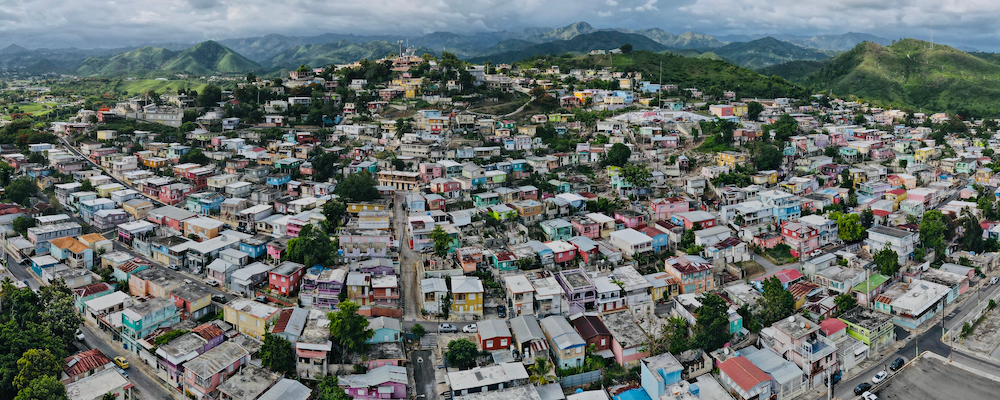
The Natural Hazards Center is happy to announce that 11 projects have been funded to help further community resilience in U.S. territories. The studies will examine how to improve health and well-being in the islands, which are threatened by severe hazards that are growing more frequent.
The territories—American Samoa, Guam, the Northern Mariana Islands, Puerto Rico, and the U.S. Virgin Islands—have been the focus of two special calls for disaster science to support public health interventions and interdisciplinary solutions to hazards in the regions. The award program was made possible with funding from the Centers for Disease Control and Prevention and the National Science Foundation.
A full list of project titles and awardees follows. Project abstracts are available on the program’s recently funded awards page.
Understanding Multi-Hazard Evacuation and Shelter Planning in the U.S. Island Territories
Lilian Bui, University of Hawaii at Manoa
Jiwnath Ghimire, University of Hawaii at Manoa
Eric Yamashita, University of Hawaii at Manoa
Karl Kim, University of Hawaii at Manoa
Addressing Abandonment as a Recovery Strategy: Transforming Health Risks into Community Assets
Luis Gallardo, University of Puerto Rico Río Piedras
David Carrasquillo, Hispanic Federation
Michelle Alvarado, Center for Habitat Reconstruction
Alison Chopel, Independent Researcher
Assessing the Well-Being and Health Impacts of Infrastructure Disruptions for Communities
Susan Clark, University at Buffalo
Ralph Rivera-Gutierrez, University of Puerto Rico
Michael Shelly, University at Buffalo
Sara Peterson, University at Buffalo
Psychosocial Needs of Women in Puerto Rico: Service Delivery after Consecutive Disasters
Kevin Fagundo-Ojeda, University of Utah
Ivis Garcia Zambrana, University of Utah
Mabel Lassalle, Connecting Paths
High Definition Social Vulnerability Index for the U.S. Virgin Islands
Greg Guannel, University of the Virgin Islands
Hilary Lohman, U.S. Virgin Islands Department of Planning and Natural Resources
Ensuring Community Resilience Through Public Trust
Kenny Hendrickson, University of the Virgin Islands
Kula Francis, University of the Virgin Islands
Anna Clarke, University of the Virgin Islands
The Role of Community-Based Organizations in Public Housing Resident Recovery after Concurrent Disasters
Sayma Khajehei, University of Utah
Elizabeth Rivera, Ponce Neighborhood Housing Services
Divya Chandrasekhar, University of Utah
Ivis Garcia Zambrana, University of Utah
Community First Aid Training as a Tool to Strengthen Community Resilience
Todd Miner, University of Colorado School of Medicine
Tayna Belyeu-Camacho, Mariana Islands College
Joan Flores, Mariana Islands College
Geri Rodgers, Mariana Islands College
Patrick George, Commonwealth of the Northern Mariana Islands
Food, Energy, and Water Security for Community Health Resilience to Compounding Disasters
Anaís Roque, Arizona State University
Enid Quintana, University of Puerto Rico
Sameer Shah, National Center for Atmospheric Research
Fernando Tormos-Aponte, University of Maryland, Baltimore County
Exploring How Transportation Access to Health Care Impacts Social Vulnerability in Puerto Rico
Diana Ramirez-Rios, Rensselaer Polytechnic Institute
William A. Wallace, Rensselaer Polytechnic Institute
Assessment of Information and Communication Technology Competency and Barriers of At-Risk Populations for Community Resilience
Nitin Roy, California State University, Sacramento
Nisha Clavier, University of Virgin Islands
The Quick Response Research Award Program is supported by the National Science Foundation (NSF Award #1635593). This special call was made possible by supplementary funding provided by the Centers for Disease Control and Prevention. Any opinions, findings, conclusions, or recommendations expressed in this material are those of the author(s) and do not necessarily reflect the views of the NSF or the Natural Hazards Center.